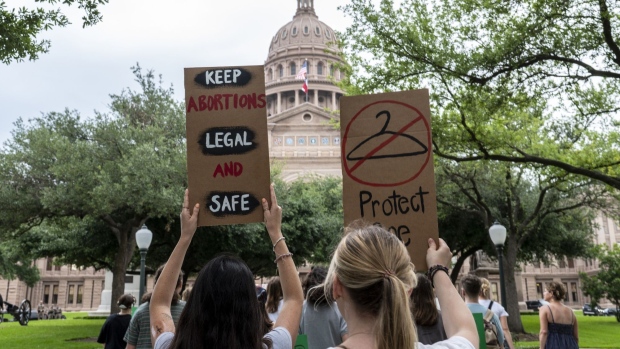Jun 24, 2022
Republican Strongholds Immediately Ban Abortions After Roe Ruling
, Bloomberg News

(Bloomberg) -- Texas and Missouri declared abortion illegal within hours of the US Supreme Court ruling that ended the nationwide right to the procedure and shifted the reproductive-rights debate back to state legislatures.
Republican bastions long hostile to the landmark 1973 Roe V. Wade case celebrated Friday’s decision while Democratic leaders vowed to shore up reproductive rights. Texas and Missouri were among 26 states considered “certain or likely” to ban or limit abortion in the post-Roe era, according to the Guttmacher Institute.
The high court’s momentous ruling means that laws regarding one of the most hotly contested social issues in the U.S. will now mostly be decided on a state-by-state basis, meaning whether women have access to the procedure will be determined by where they live.
In Texas, existing statutes that predate Roe now make abortion illegal in the state, Attorney General Ken Paxton said in a statement. The Roe decision was originally based on a challenge to a Texas law that forbade abortion.
“Some prosecutors may choose to immediately pursue criminal prosecutions based on violations of Texas abortion prohibition,” Paxton wrote.
At least one Texas group dedicated to providing financial support for women who need help getting an abortion has paused its activities. Frontera Fund, based in the border town of McAllen where it serves primarily Hispanic women in the impoverished Rio Grande Valley, said it needs time to evaluate how it can continue to help women in light of the new law.
Of the 26 states “certain or likely” to ban abortion, 22 have laws or constitutional amendments to prohibit the procedure. The other four have political composition or have taken recent action that indicates they would limit access, according to Guttmacher.
Nine states -- Alabama, Arizona, Arkansas, Michigan, Mississippi, Oklahoma, Texas, West Virginia and Wisconsin -- had an abortion ban on the books before the 1973 Roe decision. Thirteen -- Arkansas, Idaho, Kentucky, Louisiana, Mississippi, Missouri, North Dakota, Oklahoma, South Dakota, Tennessee, Texas, Utah and Wyoming -- have so-called trigger bans, in which a law would or could take effect automatically in the absence of Roe.
New York Attorney General Letitia James took to Twitter to affirm the Empire State will remain a “safe haven” for those that need abortion care. Illinois Governor J.B. Pritzker, a billionaire Democrat, called for lawmakers to meet in a special session “to further enshrine our commitment to reproductive health care rights and protections.”
Democrats are seeking to demonstrate their commitment to providing access to abortion, hoping it will give them an electoral advantage, while Republicans portrayed the decision as the culmination of years of hard work.
James, the New York AG, called the ruling “one of the darkest moments in the history of this nation.” She pledged to ensure patients from other states could come to New York to get an abortion.
“I will work tirelessly to ensure our most vulnerable and people from hostile states have access to this lifesaving care,” she wrote in a statement.
Amy Hagstrom Miller, president of the largest independent abortion provider in the US, said it remains committed to providing high-quality abortion care following the overturning of Roe, through clinics in states like Maryland, Minnesota, and Virginia, and through the mail to those states along with Illinois and New Mexico. Whole Women’s Health is “exploring plans” to expand in-clinic and mail services to other states where abortion is legally protected.
In Michigan, Democratic Governor Gretchen Whitmer denounced the Court’s decision and vowed to “fight like hell” to keep abortion legal in Michigan.
Michigan has a law on its books from 1931 that outlaws abortion. Whitmer said the law won’t take effect because of a temporary stay from a state court ruling in May.
“I am deeply disappointed that Michigan’s Republican legislative leaders have been in court defending this draconian ban, to the detriment of women and families,” Whitmer said.
In California, Democratic Governor Gavin Newsom has proposed $125 million of state spending to bolster access to reproductive health care and prepare for an influx of people seeking abortions. He also has vowed to seek voter approval to enshrine the right to an abortion in California’s constitution.
In New Jersey, Democratic Governor Phil Murphy, has proposed a bill to require private insurers to cover the cost of abortion.
New England states are almost entirely supportive of abortion rights. Massachusetts passed a law guaranteeing abortion rights in late 2020, and New Hampshire, which bans abortion after 24 weeks, softened its position in May, allowing exceptions for the mother’s life or fatal fetal conditions, and lifting the requirement for an ultrasound.
In Massachusetts, Republican Governor Charlie Baker signed an executive order to protect abortion access in the state. It also bars state agencies from helping another state’s investigation into any “person or entity for receiving or delivering reproductive health services that are legal in Massachusetts.”
©2022 Bloomberg L.P.






